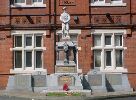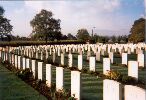
Newton-le-Willows and
Earlestown War Memorial

| OTHER WARS |
 |
Newton-le-Willows andEarlestown War Memorial |
 |
| The
Great War Roll of Honour |
|||||||||||||||||||||||||
CWGC, SDGW and the Newton and Earlestown Guardian reports all spell William's name with an 'e' rather than with the 'i' on the memorial.
William was formerly the caretaker at the Earle Street Labour Club. He had been in the army seventeen months and had seen service in Egypt and the Dardanelles, and then France. He had six children.
According to the Newton and Earlestown Guardian report published on October 1916, William's widow received a letter from another soldier, W. E. Reid, "enclosing three postcard photos as per the address on the back of one of them. These I found on the battlefield a few days ago, very near the body of the soldier to whom I quite believe they had formerly belonged. This brave soldier had fallen in a recent charge - as he lay quite dead in all his equipment. ... The holes through the cards, as you will note, have been caused by shrapnel."
At the time, William was only officially "missing" and confirmation of his death only came in July 1917. Unusually for a soldier "missing" for so long, CWGC gives his grave as Plot VII Row K Grave 20 in Regina Trench Cemetery. His grave will have been one of the many which were moved to this cemetery after the Armistice.
William was killed during the Battle of Thiepval Ridge, one of the Battles of the Somme. The Official History gives an account of the fighting involving the 11th Division which included the 9th Battalion of the Lancashire Fusiliers:
"On the right, the 11th Division (Lieut.-General Sir C. L. Woollcombe) had for its final objective Hessian Trench, situated on the highest part of the ridge, and also Stuff Redoubt; but strong patrols were eventually to go forward and occupy, "if possible", Stuff Trench - the continuation of Regina Trench. Next to the Canadians, the 34th Brigade (Br.-General J. Hill) had first to carry Mouquet Farm; then to fight its way up the old German 2nd Position and capture Zollern Redoubt; and, finally, to secure Stuff Redoubt. Two tanks were to assist in the reduction of these centres of resistance, but, as will be seen, neither entered the fight.
"The brigade attacked with the 8/Northumberland Fusiliers and 9/Lancashire Fusiliers, a bombing party of the last-named battalion seizing the known exits from the cellars of Mouquet Farm thirty seconds before zero hour.Both battalions reached and occupied the first objective - a line astride the old German 2nd Position south of Zollern Redoubt - without many casualties. The rear waves barely escaped the German barrage which came down promptly upon the British front line and caused considerable loss, including all four company commanders, to the columns of the 5/Dorset moving forward in support. After the prescribed halt of ten minutes - too short a time, according to the Lancashire Fusiliers, in which to clear the trench and dispose of prisoners - the advance was resumed in the teeth of accurate machine-gun and rifle fire from Zollern Redoubt, Hessian Trench and Stuff Redoubt.
"Pressing on most gallantly, although officers and men fell fast, the Northumberland Fusiliers became engaged in a desperate struggle around the deep dug-outs of the old German 2nd Position, including the southern half of Zollern Redoubt. Cohesion was lost, the " moppers up " were killed and wounded almost to a man, and the sole remaining officer could do no more than collect some fifty men and dig in on the right facing Zollern Trench. This remnant had made itself tolerably secure by nightfall, by which time a few of the other survivors were ensconced in shell-holes to the west of the old German 2nd Position. Only five men survived of the platoon which moved up the sunken Pozieres-Grandcourt road with orders to keep in touch with the Canadian left, and these eventually mingled with the Dominion troops. The right of the Lancashire Fusiliers had been almost annihilated by fire from Zollern Redoubt, and heavy fighting ensued in Midway Line - the trench which connected Mouquet Farm with Schwaben Redoubt-where the Germans had emplaced six trench mortars. Few men and only one officer reached the battalion's second objective, Zollern Trench, where they secured a footing but were out of touch on either flank. The leading companies of the 5/Dorset had reached High Trench, the German front line, and parties pushed on to mingle with what was left of the two battalions of Fusiliers.
"Here also it was impossible to follow the progress of the advance owing to the smoke of the German bombardment; and also to the fact that the infantry had found movement over the open to be almost impossible on account of the hostile fire. Before 1.30 P.M. it was reported that the second objective had been gained, and an hour later, following the receipt of other over-optimistic messages, Br.-General Hill ordered a section of Vickers guns and one section of the 86th Field Company R.E. to the northern side of Zollern Redoubt in order to consolidate it. Soon afterwards the commanding officers of the two Fusilier battalions, having received no news of their companies, started forward to ascertain the situation. They discovered some scattered parties in what pas been described as " an empty battlefield "; hostile machine guns in Zollern Redoubt were active and there were bursts of machine-gun fire from the Germans in Mouquet Farm.
"At the farm, amongst the rubble heaps and at the cellar entrances, confused fighting persisted, a party from the 11/Manchester, in brigade reserve, having relieved that of the Lancashire Fusiliers. Both tanks had become ditched before reaching the farm, but the crew of one arrived to take part in the struggle, using their machine guns with some effect; men of the 5/Dorset also assisted and a detachment of the 6/East Yorkshire (Pioneers) arrived to join them. At length, about 5.30 P.M., smoke bombs were thrown into the cellars whereupon the survivors of the garrison, an officer and 55 other ranks, surrendered.Darkness fell upon a scene of great confusion."